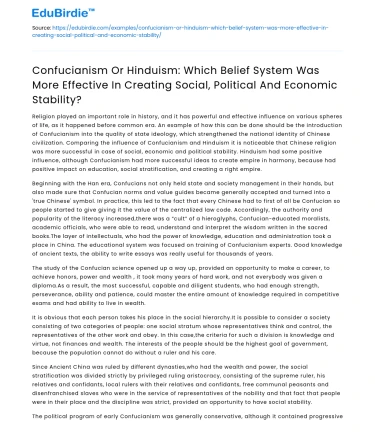Religion played an important role in history, and it has powerful and effective influence on various spheres of life, as it happened before common era. An example of how this can be done should be the introduction of Confucianism into the quality of state ideology, which strengthened the national identity of Chinese civilization. Comparing the influence of Confucianism and Hinduism it is noticeable that Chinese religion was more successful in case of social, economic and political stability. Hinduism had some positive influence, although Confucianism had more successful ideas to create empire in harmony, because had positive impact on education, social stratification, and creating a right empire.
Beginning with the Han era, Confucians not only held state and society management in their hands, but also made sure that Confucian norms and value guides became generally accepted and turned into a 'true Chinese' symbol. In practice, this led to the fact that every Chinese had to first of all be Confucian so people started to give giving it the value of the centralized law code. Accordingly, the authority and popularity of the literacy increased,there was a “cult” of a hieroglyphs, Confucian-educated moralists, academic officials, who were able to read, understand and interpret the wisdom written in the sacred books.The layer of intellectuals, who had the power of knowledge, education and administration took a place in China. The educational system was focused on training of Confucianism experts. Good knowledge of ancient texts, the ability to write essays was really useful for thousands of years.
Save your time!
We can take care of your essay
- Proper editing and formatting
- Free revision, title page, and bibliography
- Flexible prices and money-back guarantee
The study of the Confucian science opened up a way up, provided an opportunity to make a career, to achieve honors, power and wealth , it took many years of hard work, and not everybody was given a diploma.As a result, the most successful, capable and diligent students, who had enough strength, perseverance, ability and patience, could master the entire amount of knowledge required in competitive exams and had ability to live in wealth.
It is obvious that each person takes his place in the social hierarchy.It is possible to consider a society consisting of two categories of people: one social stratum whose representatives think and control, the representatives of the other work and obey. In this case,the criteria for such a division is knowledge and virtue, not finances and wealth. The interests of the people should be the highest goal of government, because the population cannot do without a ruler and his care.
Since Ancient China was ruled by different dynasties,who had the wealth and power, the social stratification was divided strictly by privileged ruling aristocracy, consisting of the supreme ruler, his relatives and confidants, local rulers with their relatives and confidants, free communal peasants and disenfranchised slaves who were in the service of representatives of the nobility and that fact that people were in their place and the discipline was strict, provided an opportunity to have social stability.
The political program of early Confucianism was generally conservative, although it contained progressive ideas. In practice, it contributed to the consolidation of patriarchal relations, the assertion of the rule of hereditary aristocracy. Confucian ideas of renewing the ruling class at the expense of representatives of the underprivileged strata could not lead to a radical restructuring in the state, because the latter, being brought up in ancient traditions, themselves turned into active defenders of the organization of power, which the well-known nobility advocated. The concept of the nomination of the just assumed only the easing of conflicts between the old and the new aristocracy.However, certain provisions of the doctrine, as has been said, had a progressive meaning. To them should be attributed primarily to the idea of spreading moral knowledge and teaching people, regardless of their class status. The educational activities of Confucius and his students played a huge role in the development of Chinese culture.






 Stuck on your essay?
Stuck on your essay?

